(Please, some admin correct the title because I accidentally repeated the word "tornado" and I can't fix it  )
)
I live in Bahía Blanca, a city in the centre of Argentina on the Atlantic coast. On Saturday a very unusual and unprecedented weather phenomenon occurred in the city. Whether it was a tornado or a turbonade is still not agreed, but the reality is that a storm front about 60km wide swept through the city with winds of up to 200km/h.
The result was that the city was literally destroyed. Entire roofs were blown off, thousands of trees fell, cars were flattened, houses (especially in the periphery) were destroyed, the entire electrical infrastructure was down (and of course the internet as well), some parts of the city were without water, and sadly, 14 people were killed.
According to the meteorological service, the phenomenon was formed and triggered very quickly and did not give time to prepare the city for the event.
On a personal note, I have to say that I suffered almost no damage to my home although I did have 4 days without power. Apart from that, the wind ripped the lid off the water tank above my house, so I had to improvise a lid until I can buy another one. Of the 3 basic services (water, electricity, gas) I must say that I have only suffered the loss of electricity. Unfortunately others are having a tougher time.
That said, the idea of this post is not to inspire a wave of comments of solidarity, although they are of course welcome. The main objective is to tell you how the experience went, what I have learned and the partial conclusions I have reached.
Given that this is the first time I have been in such a situation, what may be a novelty for me may be a no-brainer for many others. Nevertheless, I hope it may be of help to someone else.
Some photos...
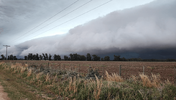
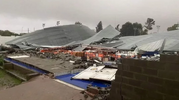
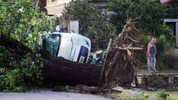
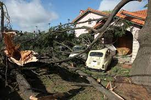
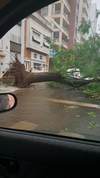
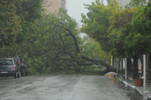
 )
)I live in Bahía Blanca, a city in the centre of Argentina on the Atlantic coast. On Saturday a very unusual and unprecedented weather phenomenon occurred in the city. Whether it was a tornado or a turbonade is still not agreed, but the reality is that a storm front about 60km wide swept through the city with winds of up to 200km/h.
The result was that the city was literally destroyed. Entire roofs were blown off, thousands of trees fell, cars were flattened, houses (especially in the periphery) were destroyed, the entire electrical infrastructure was down (and of course the internet as well), some parts of the city were without water, and sadly, 14 people were killed.
According to the meteorological service, the phenomenon was formed and triggered very quickly and did not give time to prepare the city for the event.
On a personal note, I have to say that I suffered almost no damage to my home although I did have 4 days without power. Apart from that, the wind ripped the lid off the water tank above my house, so I had to improvise a lid until I can buy another one. Of the 3 basic services (water, electricity, gas) I must say that I have only suffered the loss of electricity. Unfortunately others are having a tougher time.
That said, the idea of this post is not to inspire a wave of comments of solidarity, although they are of course welcome. The main objective is to tell you how the experience went, what I have learned and the partial conclusions I have reached.
Given that this is the first time I have been in such a situation, what may be a novelty for me may be a no-brainer for many others. Nevertheless, I hope it may be of help to someone else.
- Being prepared: thanks to the information shared on this forum over the years, I think I was pretty well prepared, at least to get through this little disaster trial. I will tell you a bit about how I fared during the experience:
- This is no secret to anyone, but having stored food such as rice, dried noodles, concentrated broths, canned goods, etc... is certainly helpful. In the days following the storm, many people started to go out to the few shops that were open looking for just such foods because, considering that there was no electricity, there was almost no food available that needed refrigeration. Demand rose rapidly and supply fell at the same rate. Having a food buffer to at least get through the first few moments is certainly an advantage. Needless to say, having water is also important. I have about 20 litres in reserve but in this case it was not necessary to use it.
- In relation to the previous point there is something very important to keep in mind: you have to have cash (paper money) because, obviously, without the internet, all digital payment systems (qr-code, credit/debit cards, etc.) are useless. Fortunately, considering the increasing fragility of the economy and the possibility of a disruptive event, some time ago I decided to keep, the old fashioned way, a good amount of cash. It was not an easy decision because in Argentina it is not seen as a good practice to keep money "under the mattress" because high inflation makes that money lose value very fast, so many people have their savings in fixed terms or digitised in current accounts that allow them to use some financial instruments to earn some money and reduce losses.
- Energy: I have already made a note of several things I need to improve in this area. Still, it wasn't too bad. Some things that helped me to cope well with the lack of energy:
- Have USB Power Banks (and keep them always charged!!!!). Fortunately I have 2 and they are always 100% charged. I plan to buy at least a couple more. This helps not only to keep the smartphones charged to communicate with the family (in case the communications work), but also to power led lights, radios, etc.
- I have an emergency light rechargeable by solar light, USB and at hand (by turning a handle). This device turned out to be a marvel because apart from illuminating and consuming very little energy, it has a radio and that allowed me to stay informed. I will have to look into buying another one with better features because the one I have needs 5 hours of turning the handle (manual charging) or 18 hours of sunlight to charge it fully. By USB it's only a couple of hours.
- 1.5V and 9V batteries: this was also useful (mostly for lighting in my case) but I understand it can be useful for many other things.
- Candles and matches: I also had a good supply of both in storage and at night it was helpful, especially while cooking or for lighting during dinner. It is worth noting that the price of the candles soared exponentially, within a couple of days they cost 5, 6 or even 10 times what they had previously cost (some traders tried to make some "extra money").
- Mood:keeping the family in good spirits is not a minor issue in these cases. My wife and my son (my daughter is studying in another city, so she was not with us) are not part of the forum, so they are not directly informed about everything that has been shared here. With my son I have a good communication channel and sometimes we have talked about some of the things we share on this forum. That is not the case with my wife.
I highlight this simply to emphasise the fact that those who are not well informed definitely start at a disadvantage in such events.Of course a person's natural temperament may make him or her more or less able to cope with the situation, but adding good information and knowledge definitely gives one more confidence and decisiveness when making decisions, as well as greater resilience. During the days when we had no electricity I had to keep in mind to try to keep my wife and son in good spirits. I was worried about how my son would cope because he uses the computer and internet a lot, but I must say that I was pleasantly surprised, he handled it with maturity and, despite being a bit bored (he is on holiday), he coped with it in good spirits for the first few days. On the fourth day he started to feel more worried and distresed. After a talk that helped him to externalise that anxiety and his worries, he felt better. I will briefly comment on the notes I took on the basis of this experience:- Having a pack of cards and board games can be a great help. For us it was not necessary to use them but I think that if this situation were to continue for a longer period of time they would be helpful.
- We had a good time listening to music on the radio and having a good chat. This seems silly, but it made the hours go by much faster.
- Two days after the event I went back to work and as the electricity had been restored in the office, I took advantage of every day to charge power banks and notebooks and download some videos to watch with my wife and son at night, which is certainly the worst time because of the total darkness and silence. For this reason I think it's a good idea to have some video material and the like stored on external disks (as long as it's possible to have some form of supplementary energy).
- People's reactions: I was able to observe all kinds of reactions. In the first moments there is a lot of solidarity and empathy, but after a few days the first signs of stress start to show. This causes people to behave a bit more selfishly. Even so, I have seen that in general a lot of people help others and make an effort to show solidarity. Of course, there are also the "others", those who are willing to do anything to "save" themselves, but at least as far as I could observe they are far fewer than those who reacted in a more positive way. I think that if the situation tends to continue for a long time this may change, but given that the event was not absolutely devastating and everything tends to normalise relatively quickly, I can't say much more about it.
- Food refrigeration: I have been looking at various alternatives. A relatively inexpensive one is to have a couple of car batteries and an inverter that converts from DC to AC. There are some details to be worked out about the type of battery and the capacity of the inverters, but the idea is that at least for a couple of days the refrigerator can still be powered. I have to study this solution a bit more. I am also thinking of combining this solution with a combustion genset which could allow (as long as I can get fuel) the power cycle by combining the two to last longer. A lot to analyse on this subject still.
- Connect more with the neighbourhood/other people: now that a few days have passed I think that the day after the event I should have approached my neighbours, asked them if they were all okay and perhaps offered some help. I realise that in the midst of the chaos of the situation, the worry about what was coming in the next few days and trying to communicate with my relatives to see if they were OK, I did not immediately consider this possibility and behaved somewhat selfishly, too concerned about protecting the people closest to me. I think this experience has taught me a few lessons that I hope to put into practice the next time I am faced with a similar situation. I now have a better idea of how my family can handle this kind of event (the uncertainty really stressed me out) and I feel better able to direct some of my energy towards connecting with people who are not necessarily close to me. I have a lot of work to do on this because my first (and perhaps somewhat instinctive) reaction was to protect my people and not pay too much attention to the rest of my environment.
Some photos...






Last edited by a moderator:

